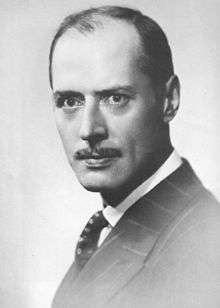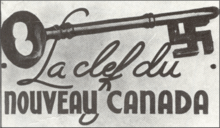Adrien Arcand

Adrien Arcand (October 3, 1899 – August 1, 1967) was a Montreal journalist who led a series of fascist political movements between 1929 and his death in 1967. During his political career he proclaimed himself the Canadian Führer.
He was detained by the federal government for the duration of the Second World War under the Defence of Canada Regulations.[1]
Biography
Arcand published and edited several allegedly anti-Semitic newspapers during this period, most notably Le Goglu, Le Miroir, Le Chameau, Le Patriote, Le Fasciste Canadien and Le Combat National. It is alleged[2] that he received covert funds from the Conservative Party, to operate his newspapers and campaign for Bennet in the 1930 Dominion general election.[3] Relations became increasingly strained afterwards as R. B. Bennett had little use for Arcand following the election. Despite desperate pleas from Arcand and his comrades to get more money to make up for their expenses, the subsidy they were receiving from the Tories was both sporadic and insufficient.[4] In 1935 the desperate Bennett ministry again turned to Arcand, who was appointed at the urging of Senator Rainville to the post of Tory publicity director in Quebec. However, many of Arcand's friends were more sympathetic to the Reconstruction Party, so Le Patriote supported H. H. Stevens while its editor was campaigning for Bennett.[5]
In 1934, he established the Parti National Social Chrétien (Christian National Social Party), which advocated anti-communism and the deportation of Canadian Jews to Hudson Bay. The latter idea was inspired by his friend, noted British Rhodesian fascist Henry Hamilton Beamish, who suggested sending the Jews to Madagascar. Bennett secretly hired Arcand as his chief electoral organizer in Quebec for the 1935 federal election.
In 1938, Arcand was chosen leader of the fascist National Unity Party of Canada, born of the fusion of his Parti National Social Chrétien with the Prairie provinces’ Canadian Nationalist Party and Ontario’s Nationalist Party, which had grown out of the Toronto Swastika Clubs of the early 1930s.

Arcand was always a staunch federalist and an anglophile. He received secret funds from Lord Sydenham of Combe, former governor of Bombay and a prominent fascist sympathizer in the British Conservative Party. He also maintained correspondence with Arnold Spencer Leese, chief of the Imperial Fascist League. Arcand’s party statutes called for the following oath to be taken at the beginning of every party meeting:
- "Moved by the unshakable faith in God, a profound love for Canada, ardent sentiments of patriotism and nationalism, a complete loyalty and devotion toward our Gracious Sovereign who forms the recognized principle of active authority, a complete respect for the British North America Act, for the maintenance of order, for national prosperity, for national unity, for national honour, for the progress and the happiness of a greater Canada, I pledge solemnly and explicitly to serve my party. I pledge myself to propagate the principles of its program. I pledge myself to follow its regulation. I pledge myself to obey my leaders. Hail the party! Hail our Leader!"[6]
Arcand always was steadfastly opposed to Quebec nationalism. He wanted to build a powerful centralized Canadian Fascist state within the British Empire.
- "… Arcand insists that his organisation has no sympathy with the extreme French nationalist movement represented by the group which split from Premier Duplessis after he was returned to power because he would not go all the way they wished. "We were the first in Quebec to fight Separatism," Arcand declared, "and we are carrying on that fight very satisfactorily, swallowing many ex-members of that failing movement." Frankly, the National Social Christian Party was aiming for Dominion power, Arcand admitted, describing Dominion power as the real key to the vital problems of this country."[6]
On May 30, 1940, he was arrested in Montreal for "plotting to overthrow the state" and interned for the duration of the war as a security threat. His party, then called the National Unity Party, was banned. In the internment camp, he sat on a throne built by other prisoners and spoke of how he would rule Canada when Hitler conquered it.[7]
Arcand ran for the Canadian House of Commons on two occasions. Despite being shunned by mainstream Quebecers in the post-war years, he managed to come second with 29 per cent of the vote when he ran as a National Unity candidate in the riding of Richelieu—Verchères in the 1949 federal election . He came second again with 39 per cent of the vote when he ran as a "Nationalist" in Berthier—Maskinongé—delanaudière in the 1953 election.[8]
In 1957, he campaigned for Progressive Conservative candidate and future Quebec cabinet minister Remi Paul.
Arcand never wavered in his belief in Adolf Hitler, and, in the 1960s, was a mentor to Ernst Zündel, who became a prominent Holocaust denier and neo-Nazi propagandist in the latter part of the 20th century.
On November 14, 1965, he gave a speech before a crowd of 650 partisans from all over Canada at the Centre Paul-Sauvé in Montreal which was draped in the blue banners and insignia of the National Unity Party. As reported in La Presse and Le Devoir, he took the occasion to thank the newly elected Liberal Member of Parliament for Mount Royal, Pierre Trudeau, and former Conservative leader George Drew, for speaking in his defence when he was interned. However, Trudeau and Drew denied that they had ever defended Arcand, or his views, and insisted that they had in fact been defending the principle of free speech even for fascists.
Among those present at the rally were Jean Jodoin, a Progressive Conservative candidate in the 1965 federal election and Gilles Caouette, future Social Credit Party of Canada Member of Parliament.[9]
In popular culture
- Arcand is portrayed by Haley Joel Osment in Kevin Smith's 2016 comedy horror film Yoga Hosers.[10]
References
- ↑ Betcherman, Lita-Rose The Swastika and the Maple Leaf (1978) p. 146
- ↑ Lester, Normand (2001) Le Livre noir du Canada anglais; Montreal: Les Éditions des Intouchables, p.255. The letter is conserved at the National Archives of Canada in Ottawa. A photocopy can be found at the archives of the Canadian Jewish Council in Montreal, under P0005 ARCAND, Adrien (collection).
- ↑ Lester, Normand (2001). Le Livre noir du Canada anglais; Montreal: Les Éditions des Intouchables, p.255-260.
- ↑ Betcherman, Lita~Rose (1975). The Swastika and the Maple Leaf: Fascist Movements in Canada in the Thirties; Fitzhenry & Whiteside, p.10-11.
- ↑ Betcherman, Lita~Rose (1975). The Swastika and the Maple Leaf: Fascist Movements in Canada in the Thirties; Fitzhenry & Whiteside, p.43-43.
- 1 2 Frederick EDWARDS. « Fascism in Canada », Maclean’s Magazine, 15 April 1938, p. 66.
- ↑ This story is told in Dangerous Patriots: Canada's Unknown Prisoners of War, by William Repka and Kathleen Repka, New Star Books, Vancouver, 1982 (ISBN 0-919573-06-1 or ISBN 0-919573-07-X), in the section by Charlie Murray, who was imprisoned with him for being a union organizer.
- ↑ House of Commons website
- ↑ "Fascist Steps Out Of Past For Banquet", Globe and Mail, November 15, 1965
- ↑ Daily Mail 16 September 2014
Sources
- William Repka, Kathleen Repka: Dangerous Patriots: Canada's Unknown Prisoners of War. New Star Books, Vancouver, 1982 ISBN 0-919573-06-1 oder ISBN 0-919573-07-X
- Martin Robin: Shades of Right: Nativist and Fascist Politics in Canada, 1920-1940, University of Toronto Press, Toronto (u.a.) 1992 ISBN 0-8020-5962-7 (Geb.) ISBN 0-8020-6892-8 (Paperback)
- Hans Strömsdörfer: Arcand, Adrien In: Wolfgang Benz: Handbuch des Antisemitismus: Judenfeindschaft in Geschichte und Gegenwart (Band 2/1 Personen A-K). 1. Auflage. De Gruyter, Berlin 2009, ISBN 978-3-598-24072-0, S. 31-32.
Further reading
- Adrien Arcand, führer Canadien, Montréal, Lux Éditeur, 2010.